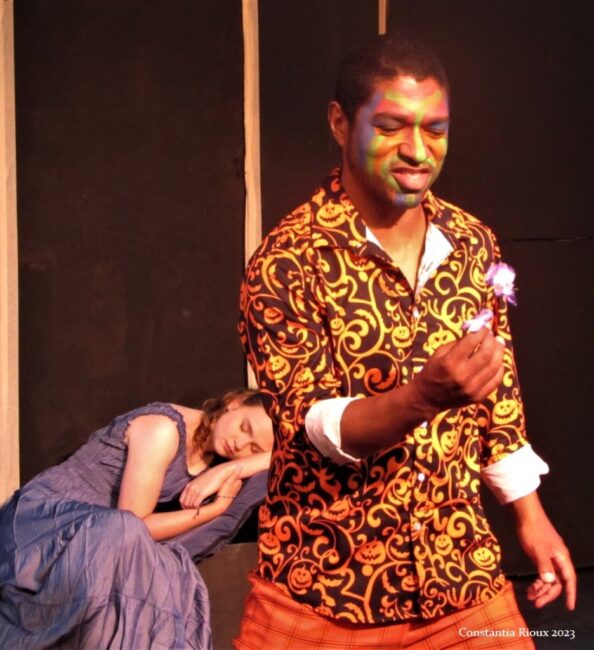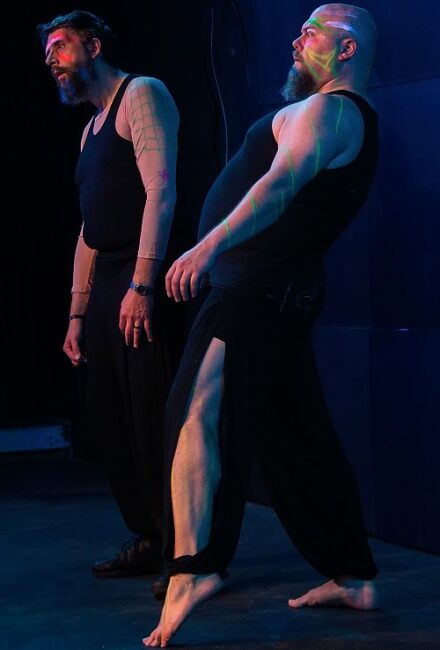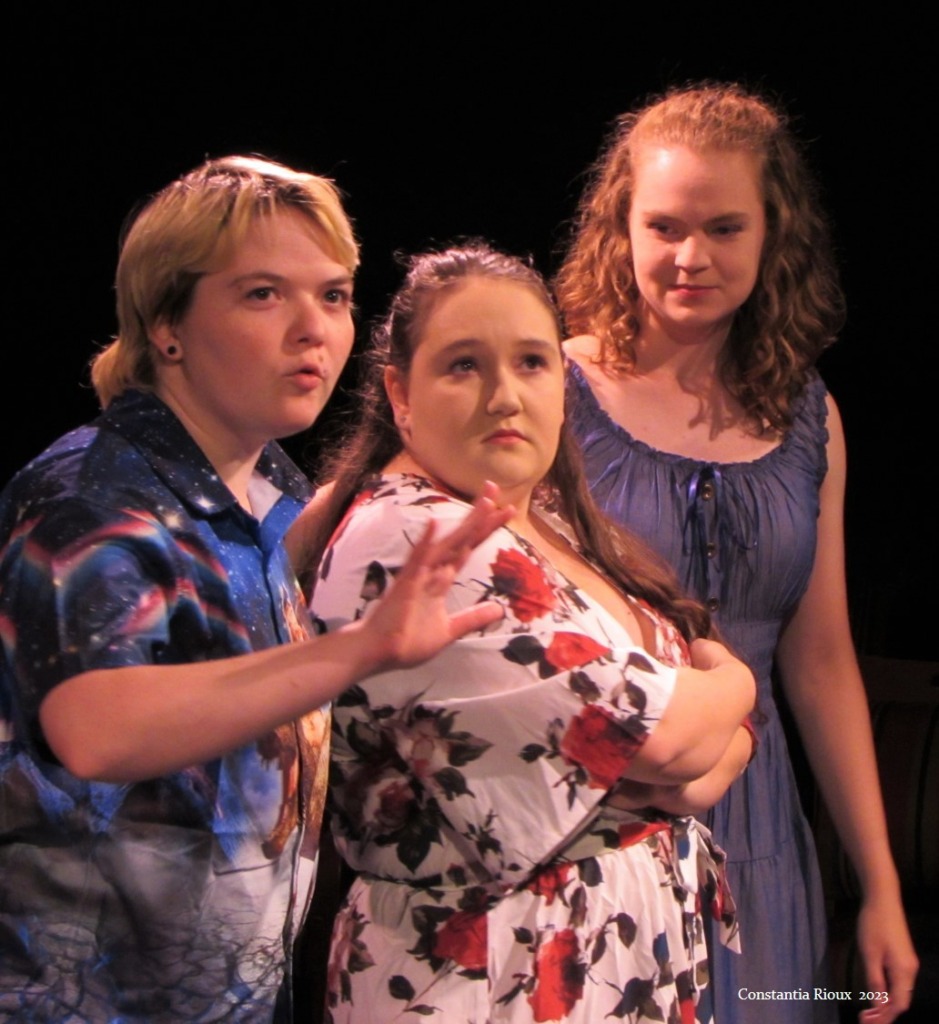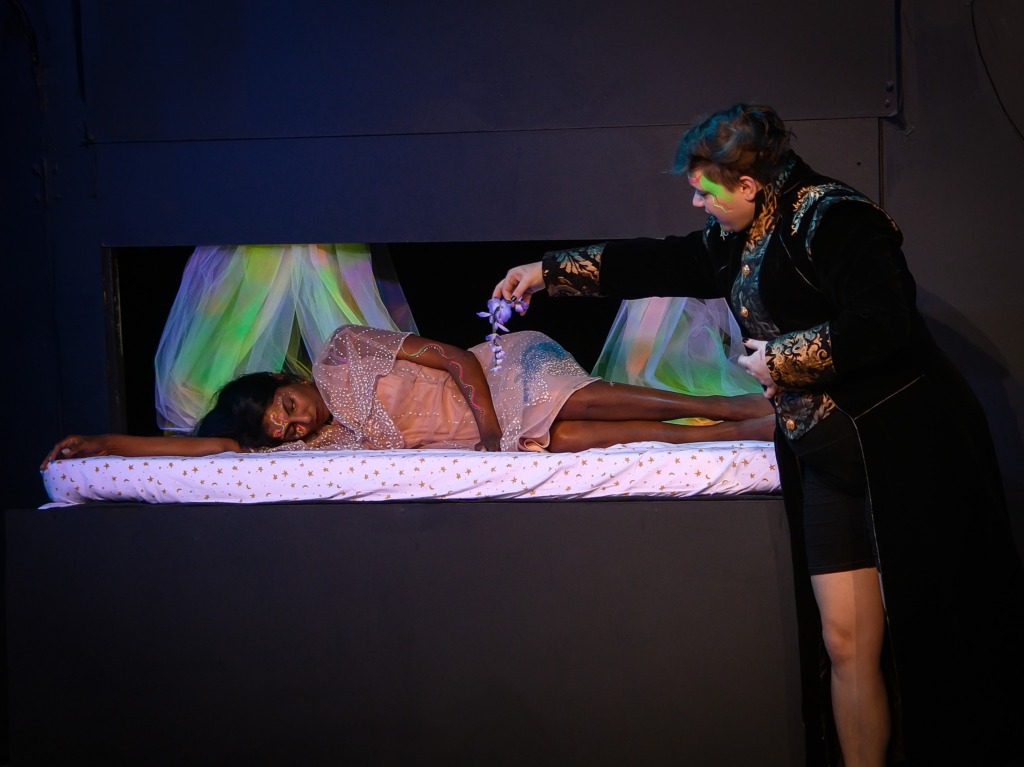What hempen home-spuns have we swaggering here? Tis a crew of Rude Mechanicals and they indeed find themselves Ill Met By Moonlight. Some six years in the making, TRM finally gets to bring their dream production of Shakespeare’s A Midsummer Night’s Dream to light. UV light, that is. Playing at the Greenbelt Arts Center through September 9th 2023 and Directed by Joshua Engel, this judiciously rendered production of Midsummer is not your grandfolks’ fairy-tale. It’s a darker (in both visual effects and overall verve) but beautiful recobbling that cuts out a lot of the syrupy treacle and spins itself into an otherworldly ending not dissimilar to The Rocky Horror Show. Plus it’s visually enticing; you’ll want to see it!

At first glance, Erin Nealer’s set gives a minimalist vibe to the performance, mainly because the floor and back walls appear to be completely blank and black. This is a stark comparison to most Rudes’ shows, particularly as of late— where the sets have involved lavish pop-out and pop-up pieces in garish pastels of their WandaVision time-stamp. But looks can be deceiving, and in Nealer’s case, even more so. What starts as basic black has lots of… fae-felt trickery, let’s say…and gives way to the notion of ‘what happens in the dark stays in the dark until it’s light outside.’ Think Vegas only more… Shakespearean Fae Folk. Nealer’s creative genius is particularly clever and inspiring as it lends a little to the imagination, a little to the actors for their imaginations to set loose and a little to the imagination of the late, late Billy Shakes once said set is put in action.
If there’s a complaint to be had about the set it’s the approach, utilization, and overall effectiveness of the lighting design, co-fabricated by Jeff Poretsky and Liana Olear. Given the vision that Joshua Engel has set down, the concept seems direct: when night falls the faeries appear and the UV/Black-light glow effect dominate the stage. Or they should. There’s only two long, solid moment where this is the case— when Oberon first encounters Titania and again when the Faeries are getting up to their magic near the show’s conclusion. The problem with the spotty-balance of the UV-darkness lies in its execution. Nobody needs to see the humans (or their fight scene) ‘during the night.’ If you go to the trouble to paint up all the actors playing various types of Fae (and believe me The Rudes do) you want that amazing full special-effect to be enjoyed and marveled over for as long as possible. And when it’s in full-effect— when Titania and Oberon first appear— it really is breathtaking. Puck, who dons a full-painted face of UV-reactive colors, looks garishly unsettling (and not in the creepy, intended way, but in the ‘who didn’t teach that actor how to paint’ way) whenever the UV lights ARE NOT in play. But when they are, you get this glorious, borderline-nightmare effect which really enhances the darkness that Joshua Engel and the company are setting out to achieve. Same is true of the Faeries (who are doubled up from ‘The Rude Mechanical Players’) during the human-fight-scene. You see weird paint squiggle that look out of place when the lights are up. But when they finally hit their UV-fullness, it’s truly an enchanting effect. Given the way the original text has been compacted, with a great deal of the show’s focus on the Fae Folk and how they are truly the masterminds behind these trifling human dramas of the heart, the show could go from excellent to perfection if from the time Titania and Oberon are introduced to the time the ‘human lovers’ finally wake at sunrise and leave the forest, the UV-lighting were in full, non-stop effect.
But we’ve shed enough light on the lighting issues. The rest of the play is thoroughly solid, impressively enjoyable and twisted in a warped way that makes you shiver. If you like creepy carnivals and things of the like you’ll love this adaptation. If you don’t, it isn’t so off-putting as to make you feel isolated or uncomfortable. (Unless face-painted Fae Folk playing tricks on humans in the dark-wood isn’t your scene…in which case…Midsummer probably isn’t for you in any production…) What Director Joshua Engel and his team of Assistant Directing Cohorts (Alan Duda and Liana Olear) do well is frame the show in such a way that it suits all audiences. It’s new enough and refreshing enough with a clever lens of darkness shaded over it that people who have seen Midsummer dozens of time (hi, it’s me, I’m that audient) will feel engaged. But it’s also true enough to the text and the story that those who have never seen Midsummer or who have seldom encountered it, will still feel as if they’ve experienced a genuine Shakespearean comedy. I’ve often thought (and probably said) that if Shakespeare had The Rudes, as a company, with him whilst penning these things, we all could have had the streamlined version centuries ago. Engel and his team (and the company generally as a whole) excel at pulling out the meat of the narrative, giving it a focal life all its own, and dispensing with the verbosely unnecessary. Their production of Ill Met By Moonlight is no exception; it runs just under 90 minutes.

The costumes are…odd. Like not in a “who greenlit these for this production?” odd, but just— unusual. Enough to make you tilt your head a little to the side and go “Huh?” And yet, despite their strangeness, Spencer Dye’s work seems to fit without question into the overall approach of the show’s aesthetic. It’s hard to describe, without going into lengthy, exacting detail of each individual character’s costume, but they’re just a little off. Which is actually quite fitting for the overall disorienting, but enjoyable experience, that is the production on the whole.
Performances across the board are far from ill-met when it comes to delivering the Shakespearean tongue. You get crisp articulation, emotional expression, and individualism abound in each performer— of whom there are 13. The play kicks off without a lot of faff or fanfare— the lovers having a bicker-fest the way the lovers do in this show— before bolting to the woods. Enter the Players. All of Shakespeare’s shenanigans should start straight out the gate with the ‘play within a play’ scene (think about that for a minute, you Hamlet-lovers) as it sets the tone for all the curious chaos that’s coming down the pipe. Peter Quince (Peter Eichman) gathers the merry band of odd-ducks, preparing to put on a play…for no particular purpose as there’s no King or Queen of the human variety and no big-nuptial-celebration either— but why wouldn’t The Rude Mechanicals rehearse in the woods? (Have you checked out rehearsal hall rental prices lately? Can you blame them?) Eichman has this particularly quirky modern-hipster vibe about him, acting like that director who just wants to get things on the road and get the end-product ready to roll. It’s very humorous to watch, particularly when he has to correct certain performers on their pronunciations.
You’ve got Petere Orvetti playing Wall… I mean Snout. Snout-Wall. And he’s a good wall. (And his wall-curtain-costume is of the most excellent cloth-print loam!) The shenanigans with his chink will certainly garner some chuckles from the audience. Then there’s Richard Atha-Nichols as Snug the joiner. Watching Peter Eichman’s Director-Quince character realize he’s basically forgotten about that member of the company is hilarious. Watching Atha-Nichols have that simplicity of ‘hi, me, still here,’ about him as he embraces ‘lion’ in the role, is hysterical. Stephen Duda takes up the mantle of Robin Starveling, who gets the most sparkly costume of the players when being ‘moon’ (and later gets one of the cooler faerie costumes, with a glowworm style tail) and Laurel Miller-Sims plays Francis Flute who has clearly had more than enough of Nick Bottom (Kate Medwar-Vanderlinden)’s crap. Watching Miller-Sims roll their eyes and huff about as Medwar-Vanderlinden goes high-ham-full-camp is just another delightfully chucklesome moment in the production.
Medwar-Vanderlinden is a delight as Nick Bottom and wears that ‘ass-mask’ quite well once such a faerie curse is laid upon the character. It’s even more entertaining to watch Medwar-Vanderlinden, whose grasp of Shakespearean delivery is superb, boss her fellow players about when in the Queen-Faerie-Bed scene, as the players all double up as Cobweb, Mustardseed, Peaseblossom, Moth, and Moonlight during those moments.

While the humans take a semi-backseat to the driving force of this production, it doesn’t make them any less impressive as performers. Ethan Clarkewallis, Lucian Clarkewallis, Becca Korn, and Peri Walker slip into the roles of Lysander, Demetrius, Hermia, and Helena respectively. The four play extremely well together and have not only an excellent understanding of how to ‘speak the speech they pray you’ and do so with emotional fortitude, but they also each have an impressive awareness of their spatial relationships to one another and the unseen faerie forces that command them, control them, and ultimately move them about on the stage. There are definitely some blurred lines amongst Clarkewallis, Clarkewallis, Korn, and Walker about exactly who is who and while that may seem just a little confusing at first, I think it’s actually intentional, sending the dual message of: 1.) All humans are the same to faeries and 2.) they’re all going to attempt to go be in a big polyamorous thing together…if they can ever get out of these woods. They each bring a sense of the character to their portrayal while also bringing a generic verve of ‘human’ to the stage. It’s fascinating.

Oberon (Claudia Bach) and Titania (Aparna Sri) have the audience in full awe when they first appear on the scene. Yes, you encounter Puck (Wes Dennis) before their entrance, but when Bach and Sri take the stage together, it’s the first time the full-effect of the UV-lighting comes into play. It’s marvelous. The way Bach and Sri play off one another is awe-inspiring. Their emotions are tremendous, sucking up all the air in the play space. They are, after all, rulers of the Fae Kingdom and this show focuses heavily on the influence of Fae in the mortal realm, so why shouldn’t they be? When Sri initiates her displeasure with Oberon, you get this sense of thorough fury with a voice that swells into a maelstrom ready to break upon the pate that is her king. Versatile of tongue and poetic delivery, there is a softness, like a whispering vernal breeze that creeps through her voice when speaking in full, colorful imagery of her little human-lad-child. Bach’s Oberon directs more of the tempestuous fury at Puck, though Dennis is having none of it, and seemingly reminding Bach that while he may play the role of servant to Oberon’s master, he is a spirit of uncontrollable proportions and shall do as he pleases.
Wes Dennis is certainly an unruly Puck. Not high-mischief like some Pucks. Not subservient to Oberon’s whim, showcasing some distorted Fae-Folk pecking order, but of his own volition a rulebreaker. And his face-paint his haunting beyond compare. Watching Dennis amuse himself with chalk-drawings whilst Oberon and Titania bicker and brawl is quite entertaining. Watching him hover like a spirit half of malevolence half of curiosity in the scenes with the humans is hypnotically unsettling. Showcasing Puck’s power, Dennis has no problems back-talking at Oberon and delivering those lines with such tenacity, one wonders if the Faerie King isn’t perhaps Puck and he’s just letting Oberon play at the role.
Impressive performances given by all. Dark and twisty vibes, with ominous music and curious lighting. Perchance, gentle mortals, you shall wonder at this show? The Rude Mechanicals and The Greenbelt Arts Center shall certainly be wondering at you if you don’t get your tickets to see this dreamy dream.
Running Time: Approximately 85 minutes with no intermission
Ill Met By Moonlight plays through September 9th 2023 with The Rude Mechanicals, a resident company of Greenbelt Arts Center— 123 Centerway in downtown Greenbelt, MD. For tickets call the box office at 301-441-8770 or purchase them online.

Beautifully written review, almost every detail accounted for by A. Gunther. Impressive attention to detail. Thank you for lending this play your focused, care-abiding attention through-out.
Oh gosh! Thank you so very much! I’ve always tried to pay specific attention to details! Especially at the community level (which people often misconstrue to mean “slapdash/hot-mess” when it comes to production quality…) I think it’s worth pointing out everything that does work, especially if it’s creative, innovative, or outside the box. Community theatre is a labor of love, and yes there are instances (and even whole companies) that support the stereotype of “slapdash/hot-mess” but that isn’t the overriding case, and often times, I think too many people forget that community theatre does have the potential to be impressive, to be good or even great quality, and to be well-done.